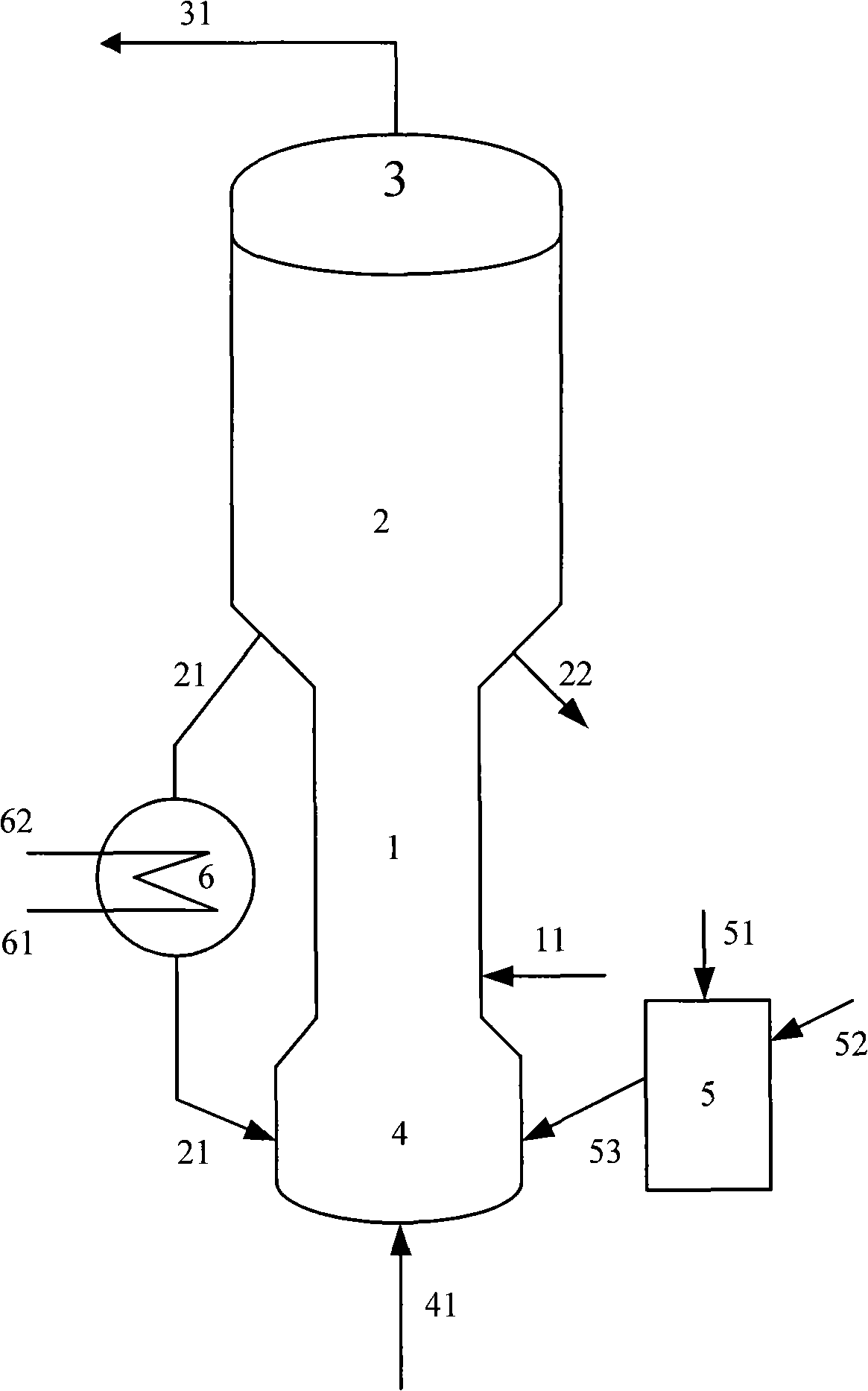Method for preparing dimethyl ether, low carbon olefin hydrocarbon with combination of methanol dehydration catalytic pyrolysis
A technology for catalytic cracking and methanol dehydration, which is used in the production of hydrocarbons from oxygen-containing organic compounds, the preparation of ethers from the dehydration of hydroxyl-containing compounds, and the preparation of ethers.
- Summary
- Abstract
- Description
- Claims
- Application Information
AI Technical Summary
Problems solved by technology
Method used
Image
Examples
Embodiment 1
[0057] The purity of methanol in the methanol raw material is 99.5% by weight, and the hydrocarbon raw material is vacuum gas oil (VGO), and its properties are shown in Table 1. The code name of the catalyst used in this example is MTD-1 (containing 20% by weight of ZSM-5 molecular sieve, 10% by weight of USY molecular sieve, and the rest is carrier, all based on the total weight of the catalyst).
[0058] The gaseous methanol raw material enters the fluidized bed reactor and contacts with the MTD-1 catalyst, and reacts at a temperature of 280°C, a pressure of 0.6 MPa, a weight ratio of catalyst to methanol raw material (agent-alcohol ratio) of 30, and a reaction time of 8.1 seconds. The stream is separated to obtain a product stream based on coke catalyst and dimethyl ether. The material composition is shown in Table 2. The material is directly sent to the stripper of the catalytic cracking unit without separation to contact with the hot catalyst. The carbon-deposited catal...
Embodiment 2
[0062] The purity of methanol in the methanol raw material is 95% by weight, and the hydrocarbon raw material is vacuum gas oil (VGO), and its properties are shown in Table 1. The code name of the catalyst used in this example is MTD-2 (containing 15% by weight SAPO molecular sieve, 10% by weight ZSM-5 molecular sieve, 10% by weight USY molecular sieve, and the balance is a carrier, all based on the total weight of the catalyst).
[0063] The gaseous methanol raw material enters the fluidized bed reactor and contacts with the MTD-1 catalyst, and reacts under the conditions of a temperature of 320°C, a pressure of 0.3 MPa, a weight ratio of catalyst to methanol raw material (agent-alcohol ratio) of 2.5, and a reaction time of 3.2 seconds. The stream is separated to obtain a product stream based on coke catalyst and dimethyl ether. The material composition is shown in Table 2. The material is directly sent to the stripper of the catalytic cracking unit without separation to conta...
Embodiment 3
[0067] The purity of methanol in the methanol raw material is 99.5% by weight, and the hydrocarbon raw material is vacuum gas oil (VGO), and its properties are shown in Table 1. The code name of the catalyst used in this example is MTD-1 (containing 20% by weight of ZSM-5 molecular sieve, 10% by weight of USY molecular sieve, and the rest is carrier, all based on the total weight of the catalyst).
[0068] The gaseous methanol raw material enters the fluidized bed reactor and contacts with the MTD-1 catalyst, and reacts at a temperature of 360°C, a pressure of 0.4MPa, a weight ratio of catalyst to methanol raw material (agent-alcohol ratio) of 1, and a reaction time of 5.4 seconds. The stream is separated to obtain the coke catalyst and dimethyl ether-based product stream. The material composition is shown in Table 2. The material is directly sent to the bed reactor of the catalytic cracking unit without separation to contact with the hot catalyst. The carbon-deposited catal...
PUM
 Login to View More
Login to View More Abstract
Description
Claims
Application Information
 Login to View More
Login to View More - R&D
- Intellectual Property
- Life Sciences
- Materials
- Tech Scout
- Unparalleled Data Quality
- Higher Quality Content
- 60% Fewer Hallucinations
Browse by: Latest US Patents, China's latest patents, Technical Efficacy Thesaurus, Application Domain, Technology Topic, Popular Technical Reports.
© 2025 PatSnap. All rights reserved.Legal|Privacy policy|Modern Slavery Act Transparency Statement|Sitemap|About US| Contact US: help@patsnap.com

